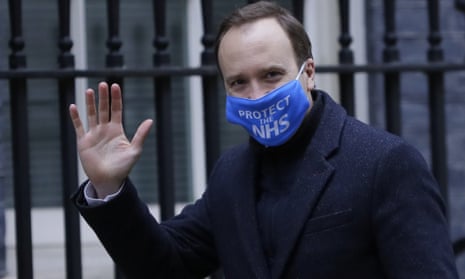Both Downing Street and the UK’s medicines regulator have contradicted a claim by Matt Hancock that Brexit helped the UK become the first western country to license a vaccine against coronavirus.
The health secretary asserted on Wednesday morning that “because of Brexit” the UK had been able to approve the Pfizer/BioNTech vaccine, rather than wait for the European Medicines Agency (EMA) to do so.
However, the government announcement of the decision said it had taken place under a provision of the Human Medicines Regulations, passed in 2012, which permits the rapid licensing of medicines in the event of an emergency such as a pandemic.
The UK is still under the remit of the EMA until the end of the Brexit transition period on 1 January, and EU laws also allow other member states to approve medicines for emergency use without EMA authorisation.
At a government briefing about the UK’s decision to become the first country to license the Pfizer/BioNTech vaccine for emergency use, the head of the UK’s Medicines and Healthcare products Regulatory Authority (MHRA), which made the decision, cited EU rules. “We have been able to authorise the supply of this vaccine using provisions under European law, which exist until 1 January,” said June Raine, the MHRA’s chief executive.
TimelineUK Covid-19 restrictions: the key political dates ahead
Show
Here are some of the key dates ahead for the UK's Covid-19 restrictions.
The current lockdown in England ends, and the new strengthened tier system comes into force with nearly 99% of England headed for the strictest two tiers. Only the Isle of Wight, Cornwall and the Isles of Scilly are set to go into tier 1, with more than 32 million people in tier 2 and more than 23 million in the toughest tier 3.
New restriction come into force in Wales. Pubs, restaurants and cafes will be banned from serving alcohol, and will be unable to open to customers beyond 6pm. Businesses can offer a takeaway service after 6pm, and if they have an off-licence can sell takeaway alcohol up until 10pm. Bingo halls, bowling alleys, soft play centres, casinos, skating rinks and amusement arcades will also have to close.
The rule allowing four people from four different households to meet indoors in pubs and restaurants will stay in place. The decision will be reviewed on 17 December.
Ministers will consider data about England's coronavirus cases weekly throughout the tiers period, while legislation requires a formal review of tiering allocations every fortnight. The first review point is 16 December, with new tier allocations announced the following day – decided by a cabinet committee chaired by the prime minister. They will come into effect on Saturday 19 December, Boris Johnson said.
For five days over Christmas there will be a UK-wide relaxation of rules to let up to three households form a 'bubble' so they can mix socially indoors and stay overnight to enjoy the festive period together. In Scotland, a maximum of eight people will be allowed but that does not include under-12s. In Northern Ireland, the window has been extended to 22-28 December to allow for additional travel time between countries.
Johnson has announced a “sunset” clause on the tiered restrictions in England, meaning they will expire on 3 February and require MPs’ approval if they are to be extended into March.
Asked about the contradiction between these comments and Hancock’s stated view, Boris Johnson’s spokesman pointedly declined to back the health secretary.
“I think the important point is that we are the first country in the world to approve this vaccine, thanks to the hard work of the MHRA,” he said, when asked whether Hancock had been correct to credit Brexit.
Pressed repeatedly on whether No 10 agreed with Hancock, the spokesman said only: “As I’ve said, it’s clear that we’re the first country in the world to approve this vaccine, and it’s obviously incredibly positive news.”
The health secretary made the claim in an interview with Times Radio, saying one reason for the quick approval was the MHRA’s “great job of working with the company to look at that data as it’s come through and do things in parallel, rather than one after the other as they normally would”.
Hancock continued: “The second reason is because, whilst until earlier this year we were in the European Medicines Agency, because of Brexit we’ve been able to make a decision to do this based on the UK regulator, a world-class regulator, and not go at the pace of the Europeans, who are moving a little bit more slowly.
“We do all the same safety checks and the same processes, but we have been able to speed up how they’re done because of Brexit.”
The Liberal Democrats said Hancock had been playing “fast and loose with the facts” over the vaccine. The party’s health spokeswoman, Munira Wilson, said the claim “is not only fanciful, but shows his desperation to try and point-score, no matter how ridiculous it makes him look”.
The ability for the UK to approve the vaccine before the EMA falls under section 174 of the Human Medicines Regulations, which also allows for medicine approvals in the event of emergencies, not only in pandemics but also in the event of nuclear or chemical contamination.
In October, Hancock’s department updated the regulations to boost the MHRA’s ability to push through vaccine approval.
A government source said that while such a route would have been open to other EU states, the UK was focused on non-EMA approval as “part of wider conversations” about the MHRA’s lead role in medicines regulation after Brexit, and that this most likely speeded up the vaccine approval process.
The EMA’s role in UK regulation will not fully end on 1 January, as its approvals will still be valid in the UK for two more years, as well as those made by the MHRA.
